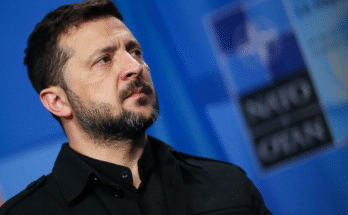KANANASKIS, Alberta — California Democrats are no strangers to clashes with Donald Trump, but this past week marked an escalation unlike anything they’ve seen before. The state found itself on the defensive, absorbing a relentless barrage of federal actions that left it reeling and exposed the limits of its power against a determined White House.

“We’re at DEFCON 1 in the conflict between California and the Trump administration,” declared Democratic strategist Katie Merrill, emphasizing the unprecedented scale of the assault.
The onslaught began with immigration raids across Los Angeles, followed by Trump’s deployment of thousands of National Guard troops to the region, overriding Governor Gavin Newsom’s objections. The administration then moved to gut California’s vehicle emissions standards and even mulled withholding education funds over the state’s policies on transgender athletes.
The week’s events culminated in a shocking incident: a video clip emerged showing senior U.S. Senator Alex Padilla being forcibly removed, pulled to the ground, and handcuffed at a Department of Homeland Security news conference. This image quickly became a stark symbol of the escalating stakes. That same night, a federal judge ordered an end to the president’s unilateral National Guard deployment, only for an appeals court to temporarily preserve Trump’s authority, adding to the legal and political uncertainty.
Governor Gavin Newsom succinctly summarized the state’s predicament in a Tuesday night address: “The moment we’ve feared has arrived.”
Trump’s intense focus on California is hardly surprising. As a deep-blue state and a wellspring of national Democratic figures like Newsom and former Vice President Kamala Harris, California has been a consistent target for Republicans and conservative media. While state officials had prepared for a second Trump administration by studying “Project 2025” and setting aside funds for legal battles, the ferocity of this week’s offensive still caught them off guard.
“Federalizing the National Guard was in the 2025 plan, but we hoped he wouldn’t do something so drastic and dramatic,” said Dana Williamson, Newsom’s former chief of staff. “He’s pulling the trigger on everything all at once.”
Trump’s decision to leverage the National Guard and Marines for his immigration agenda, particularly in Los Angeles—a stronghold of Latino political power—has transformed California into a globally watched test case for the boundaries of federal authority. The forceful restraint of Senator Padilla at a press conference, just hours before Judge Charles Breyer’s ruling on the Guard, drew widespread Democratic condemnation and underscored the perceived overreach of the White House.
Democrats widely condemned the administration’s actions, arguing they pushed California to the brink of authoritarianism. Beyond Padilla’s confrontation, federal pressure extended to prominent union leader David Huerta, who was detained, while Senator Josh Hawley launched an investigation into a Los Angeles-based immigrant advocacy group. Border czar Tom Homan even threatened to arrest anyone, including Governor Newsom, who interfered with federal enforcement.
“This is about an abuse of power. This is about a desire to cross red lines time and time again,” stated California Democratic Party Chair Rusty Hicks. “We see that in other parts of the world. We don’t see that here. If there weren’t enough wakeup calls over the last week, that sure is one.”
Beyond immigration, the Trump administration’s actions on climate change and education funding further intensified the storm engulfing California. “They’re looking to make California the punching bag,” said Mike Young, Executive Director of California Environmental Voters, expressing disgust at the developments.
As a pillar of Democratic politics and the world’s fourth-largest economy, California has long strived to shape its own agenda. During Trump’s first term, the state enacted a “sanctuary” law to protect immigrants and brokered an auto emissions deal that Newsom hailed as a “checkmate.” However, this week proved that Trump holds the most powerful pieces in this ongoing chess match: a cooperative Republican Congress, a conservative Supreme Court, and, critically, federal supremacy over even large, wealthy states.
“The idea that the federal government can bigfoot the state government is coming to the fore,” explained Loyola Law School professor Jessica Levinson. “We are experiencing that, if you have a power struggle between the federal government and the states, chances are pretty high that the federal government wins.”
While Governor Newsom initially secured a victory when a judge ordered Trump to relinquish control of the National Guard, the relief was short-lived as an appeals court temporarily blocked the order. The governor has also walked back his threat to retaliate against withheld federal funding by blocking the flow of California tax dollars to Washington.
Republicans, for their part, contend the Constitution supports their actions, asserting they are safeguarding California citizens from what they deem ruinous immigration and climate policies. White House spokesperson Abigail Jackson stated that Trump “rightfully stepped in to protect federal law enforcement officers” when Newsom would not. White House spokesperson Harrison Fields added that Trump acted to quash California’s “costly, unrealistic, and tyrannical” climate policies.
“The goal is to help California,” said GOP Rep. Kevin Kiley, who championed the effort to reverse Newsom’s gas car phaseout, “and unfortunately helping California means all too often fighting against or counteracting the politicians who hold power in our state.”
Democrats, however, maintain that Trump is consistently pushing and violating legal boundaries. “The lying has become more brazen. The overreach has become more evident,” said Xavier Becerra, former state attorney general. “They’ve dialed up the severity, the volatility of their actions, they’ve dialed up the intensity of their misrepresentations, but it’s still at the end of the day the same unlawful actions the courts rejected the first time Donald Trump was president.”
California’s current Attorney General, Rob Bonta, whose office on Thursday sued to block the environmental rollbacks and confronted Department of Justice attorneys over the National Guard deployment, noted a stark difference in the current administration. “The speed and the volume in Trump 2.0 is materially different,” Bonta observed. “The shamelessness and brazenness of the violations — they seem more severe.”


